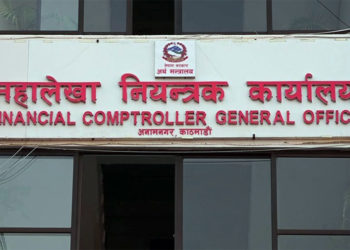KATHMANDU: Economic Digest offers a concise yet comprehensive overview of significant business happenings in Nepal, presented in easily digestible summaries.
Nepal’s economic landscape faces mounting challenges as public debt nears 47% of GDP, raising concerns over fiscal sustainability, while the stock market struggles with a sharp 53-point decline.
Gold and silver prices have also fallen, reflecting market volatility. Infrastructure projects, including three high-capacity substations in Bara and Parsa and the Asian Highway expansion, are progressing slowly, risking delays
. Industrialists accuse NEA of unfair power cuts, and Nepal’s wheat import quota from India faces uncertainty. IPO approvals remain stalled, with 84 companies awaiting clearance.
Meanwhile, the Public Accounts Committee is investigating corruption cases, and MCC aid has partially resumed despite a U.S. review. Efforts to manage used EV batteries and amend cooperative laws signal government initiatives toward sustainability and financial regulation.
Nepal’s debt rises to 46.91% of GDP
Nepal’s public debt has surged to Rs. 26.76 trillion, accounting for 46.91% of the country’s GDP, sparking concerns among economists. In the first eight months of the current fiscal year, Nepal borrowed Rs. 241 billion, primarily from domestic sources, while currency fluctuations added an additional Rs. 66 billion to the debt. On average, each Nepali citizen now carries a debt burden of Rs. 91,000.
The country has outstanding loans from eight bilateral and 16 multilateral lenders, with the World Bank and Asian Development Bank (ADB) holding 81.44% of the debt.
NEPSE declines by 53 points
The Nepal Stock Exchange (NEPSE) dropped 53.04 points (2.04%) today, closing at 2,614.68. The market recorded a total turnover of Rs. 6.32 Arba, with 12.37 million shares exchanged in 72,265 transactions.
Himalayan Reinsurance Limited (HRL) led in trading value, generating Rs. 42.06 Crores, while NMB 50 (NMB50) saw the highest gain at 3.94%. Meanwhile, Mithila Laghubitta (MLBBL) faced the biggest decline, losing 10%.
Among sectors, the Finance Index saw the most significant drop (-2.98%), while the Mutual Fund Index had the smallest dip (-0.71%). The overall market capitalization stood at Rs. 4.34 trillion.
Gold and Silver prices decline in domestic market
Gold and silver prices fell in Nepal as trading resumed for the week. According to the Federation of Nepal Gold and Silver Dealers’ Association, gold dropped by Rs. 900 per tola, trading at Rs. 174,100.
Similarly, silver prices declined by Rs. 15, settling at Rs. 1,980 per tola. In global markets, gold was priced at $3,022 per ounce.
Three major substations near completion in Bara and Parsa
Three high-capacity 132 kV substations, located in Amlekhgunj and Prasauni (Bara) and Birgunj (Parsa), are nearing completion to enhance power supply in Nepal’s industrial corridors.
Nepal Electricity Authority (NEA) Managing Director Kulman Ghising has directed contractors to accelerate the work to ensure timely completion.
These substations aim to improve voltage stability, boost industrial power supply, and support cross-border electricity trade with India. Plans are also in place to construct additional transmission lines and a 400 kV substation in Nijgadh to meet increasing industrial demand.
Industrialists accuse NEA of unfair power cuts
Industrialists have alleged that the Nepal Electricity Authority (NEA) is implementing biased power cuts, leading to shutdowns of up to 12 hours for industries while ensuring uninterrupted supply for households.
Cement, steel, and textile manufacturers criticized NEA for denying the existence of load shedding and failing to provide a structured power cut schedule.
Business groups are urging the government to implement the Lal Commission report to resolve disputes regarding dedicated and trunk power lines, arguing that NEA’s actions are unfair and misleading.
Nepal’s wheat import from India faces uncertainty
Nepal has been allocated a 200,000-ton wheat import quota from India, but concerns remain over its full utilization. Out of 41 approved commercial firms, only 30 have expressed interest in importing wheat due to restrictive conditions such as advance payment and a three-month deadline.
Importers are requesting an extension, fearing losses as domestic wheat enters the market. Additionally, concerns persist over the reliability and quality of wheat supplied through India’s NCEL. Business leaders are advocating for direct government-to-government agreements with payment upon delivery to ensure security.
IPO approvals stagnate as 84 companies await SEBON’s green light
The Securities Board of Nepal (SEBON) is facing mounting delays in IPO approvals, with 84 companies awaiting clearance.
Since the start of the fiscal year, only five IPOs have been approved, largely due to new parliamentary regulations that mandate IPO clearance only for companies with a net worth above Rs. 90 per share.
Further delays stem from the absence of a SEBON chairman and slow financial reporting by companies. Hydropower firms, which dominate IPO applications, are particularly affected. SEBON is now working on regulatory revisions to address these inefficiencies.
Slow progress on Kakadbhitta-Padajungi road puts Asian Highway Project at risk
The expansion of the 45-km Kakadbhitta-Padajungi section of the East-West Highway, part of Nepal’s Asian Highway network, is facing delays despite a year of construction.
Only 15% of the work has been completed so far, missing the expected 20% milestone, raising concerns about meeting the 2027 completion target.
The Rs. 34.9 billion project, funded by the Asian Development Bank, includes road widening, culverts, and bridges, with additional contracts awarded for major river crossings. Authorities are urging contractors to accelerate work before the monsoon season to prevent further delays.
PAC to investigate 48 cases amid corruption allegations
The Public Accounts Committee (PAC) has initiated investigations into 48 of over 100 complaints, forming seven subcommittees to examine cases involving telecom revenue leaks, fraudulent bidding, insurance irregularities, and corruption in aviation.
Key institutions under scrutiny include Nepal Telecom, Ncell, the Nepal Stock Exchange, and Millennium Challenge Corporation (MCC) projects.
Allegations range from unauthorized casino licensing to mismanagement of IPOs and infrastructure funds. PAC has recommended legislative amendments to tighten financial oversight and curb corruption.
Om Megashree Pharma IPO allotment set for Chaitra 12
The IPO allotment of Om Megashree Pharmaceuticals Limited is scheduled for Chaitra 12, 2081, at Prabhu Capital, Lazimpat. The company had issued 18 lakh shares worth Rs. 18 Crores, with 14.76 lakh units available for the general public.
With 19.88 lakh applicants requesting 2.36 crore shares, only 1.47 lakh investors will secure allotments.
Non-Life Insurance Sector Collects Rs. 28 Billion in Premiums in Eight Months
In the first eight months of the fiscal year, 14 non-life insurance companies in Nepal collected Rs. 28.02 billion in premiums from 1.84 million policies.
Shikhar Insurance led the market with Rs. 4.01 billion in premium collection, followed by Sagarmatha Lumbini with Rs. 3.32 billion.
Other major insurers include Himalayan Everest (Rs. 2.21 billion) and IGI Prudential (Rs. 2.37 billion). In February alone, non-life insurers issued 221,776 policies, generating Rs. 3.75 billion in revenue.
MCC Aid to Nepal resumes partially amid U.S. foreign aid review
The United States has signaled continued support for Nepal under the Millennium Challenge Corporation (MCC), despite an ongoing review of foreign aid programs. While some MCC-funded projects faced initial delays, key procurement and operational activities have now resumed.
Work has restarted on consultant hiring for infrastructure projects such as the Dhankhola-Lamahi and Narayanghat-Muglin road upgrades. The $555 million MCC grant also includes a 400 kV transmission line. Full program continuity remains uncertain until the U.S. review is completed.
Nepal develops plan for managing used EV batteries
The Nepal government has drafted a framework for managing used electric vehicle (EV) batteries, proposing their reuse in solar plants, power banks, substations, and research initiatives.
The plan includes battery grading based on remaining capacity, the establishment of collection centers, and financial incentives for battery returns. AI-powered platforms will guide consumers on proper disposal methods.
The government now plans to introduce regulatory standards to support sustainability as EV adoption rises in Nepal.
NA approves Bill to amend Cooperative Laws
The National Assembly (NA) has endorsed a bill to revise Nepal’s cooperative laws. Minister for Land Management, Cooperatives, and Poverty Alleviation, Balaram Adhikari, presented the proposal, which was passed by majority vote.
The amendments aim to address challenges within the cooperative sector. NA Chair Narayan Prasad Dahal announced that legislators may submit further amendment proposals before the bill is finalized.









Comment